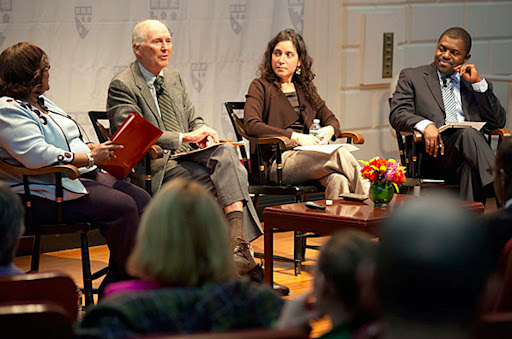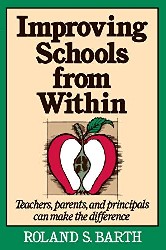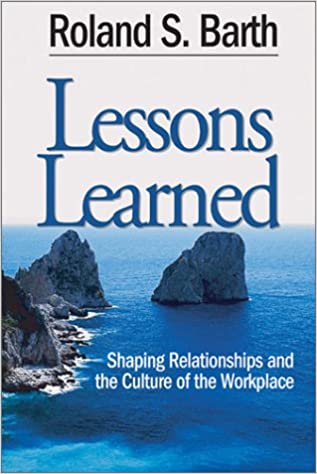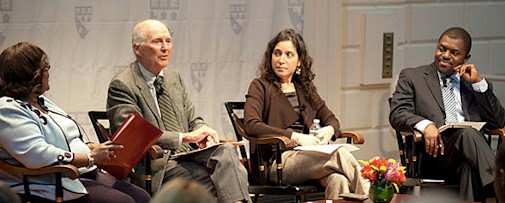
Renowned educator and thought leader, Roland Barth died on Sunday at 84. “Throughout his storied career as a teacher, principal, writer, and developer of school leaders, Roland Barth was foursquare for quality, equity, shared leadership, humor, and great metaphors. He was an author, consultant, school leader, former Harvard Graduate School of Education (HGSE) faculty member, and foremost an educator at heart. A former teacher and principal, he was also the founder of The Principals’ Center at Harvard, a professional development program based at HGSE for school principals, assistant principals, and other school leaders. For the past four decades, his work impacted educators from all over the world. He authored several books including Open Education and the American School, Improving Schools from Within, Run School Run, Lessons Learned, and Learning by Heart.” (Kim Marshall)

I had the privilege of meeting and working with Roland Barth several years at Harvard. His books grace my bookshelf and have influenced my thinking and work. His talks were always focused on school culture, improvement, the potential of others, and filled with truth. His gift for telling a story was inspiring. Recently, Kim Marshall, another recognized and leading force in K-12 education today, shared some favorite quotes from Roland Barth.

“The nature of relationships among the adults within a school has a greater influence on the character and quality of that school and on student accomplishment than anything else. If the relationships between administrators and teachers are trusting, generous, helpful, and cooperative, then the relationships between teachers and students, between students and students, and between teachers and parents are likely to be trusting, generous, helpful, and cooperative. If, on the other hand, relationships between administrators and teachers are fearful, competitive, suspicious, and corrosive, then these qualities will disseminate throughout the school community.”

“A precondition for doing anything to strengthen our practice and improve a school is the existence of a collegial culture in which professionals talk about practice, share their craft knowledge, and observe and root for the success of one another. Without these in place, no meaningful improvement – no staff or curriculum development, no teacher leadership, no student appraisal, no team teaching, no parent involvement, and no sustained change – is possible.”
“The primary problem with public education is not that teachers and principals aren’t doing their jobs. The problem is that they are frequently under pressure to behave in ways dictated by others…”

“From the teacher’s standpoint, a resentful parent can make a school year a torment. As one teacher put it, ‘It’s a little like driving down the turnpike with a hornet in the car. It’s only one hornet, but it can sure interfere with where you’re trying to go, getting there, and how you feel about the trip!’ If Ms. Smith is trying to educate children while some of their parents are persistently trying to educate her, she has her hands full.”
“Many parents control the hour at which a child goes to bed at night, but much as they might like to, these parents cannot control the hour that a child goes to sleep. Similarly, we in the schools can control to some extent what is taught, but we cannot ensure what is learned.”

“The teacher who can intelligently appraise what children are doing today can prepare an effective lesson tomorrow.”
“Good education is neither gerbils nor workbooks; it is not externally prescribed behavior for teacher or student. Rather, good education is rooted in a teacher’s personal belief about how children learn best. Good education grows in a situation where the teacher’s behavior is a response to first-hand observations of children’s behavior. Thus, good education necessarily varies from classroom to classroom, teacher to teacher, year to year.”
“My objective is for all of us to come to school each September with at least one significant new element in our professional (and therefore personal) lives – something to dream about, think about, worry about, get excited about, be afraid about, lose sleep about, become and remain alive about.”

“The successful school principal is a culture builder, one who discovers and has the courage and resourcefulness to provide conditions within the school that are hospitable to human learning–that’s what it means to be an educator. Successful principals are maniacally focused on promoting learning. Successful principals are more focused on promoting learning and long-term life-long learning than they are on short-term performance.”
“Successful principals are committed to social justice. Many youngsters have parents running interference for them. But many others have no advocates outside the schools. The principal’s work is to make sure that every youngster has an advocate within the school. Often this means the principal becomes a central advocate for disenfranchised children.”
Please join me in holding the Barth family in the Light.

